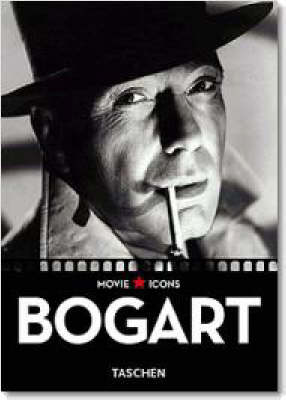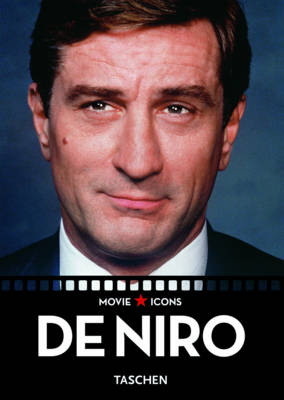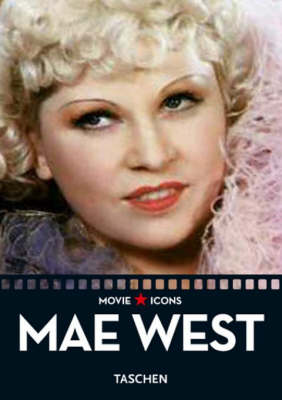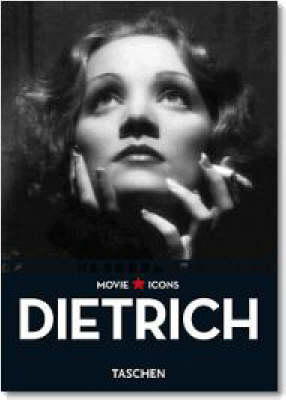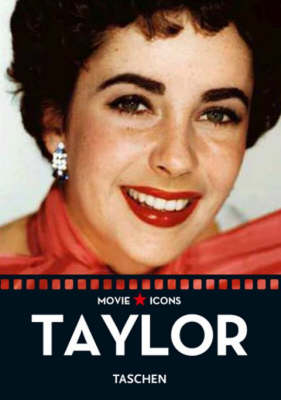Movie Icons
5 total works
Humphrey Bogart is a legend and an icon whose magic has not dissipated with time. The wounded tough guy image Bogart molded over the decades of his career still resonates. There is a truth to this image; audiences sense that the world-weariness, the angst, and the vulnerability, which made him an icon of noir as well, were rooted somehow in reality. Even if the spectator knew nothing about his personal life, they believed and still do believe in his performances in cinema classics like "Casablanca", "The Maltese Falcon", "High Sierra", "The Big Sleep", "In a Lonely Place", and "The African Queen". The "Movie Icon" series: People talk about Hollywood glamour, about studios that had more stars than there are in heaven, about actors who weren't actors but were icons. Other people talk about these things, "Taschen" shows you. "Movie Icons" is a series of photo books that feature the most famous personalities in the history of cinema. These 192-page books are visual biographies of the stars.
For each title, series editor Paul Duncan has painstaking selected approximately 150 high quality enigmatic and sumptuous portraits, colorful posters and lobby cards, rare film stills, and previously unpublished candid photos showing the stars as they really are. These images are accompanied by concise introductory essays by leading film writers; each book also includes a chronology, a filmography, and a bibliography, and is peppered with apposite quotes from the movies and from life.
For each title, series editor Paul Duncan has painstaking selected approximately 150 high quality enigmatic and sumptuous portraits, colorful posters and lobby cards, rare film stills, and previously unpublished candid photos showing the stars as they really are. These images are accompanied by concise introductory essays by leading film writers; each book also includes a chronology, a filmography, and a bibliography, and is peppered with apposite quotes from the movies and from life.
You talkin' to me? Most moviegoers associate actor Robert De Niro with adjectives like 'intense', 'violent', 'streetwise', and 'brooding'. It is an image that De Niro has carefully nurtured over the last fifty years of his career. He used gesture, voice, and, most importantly, his mesmerizing eyes to convey to the audience the disturbing emotions with which he imbued his characters, from his earliest films like "Mean Streets" through classic portraits of violent, disaffected men like Travis Bickle in "Taxi Driver" and Jake La Motta in "Raging Bull" up to and including comic tour de forces like the maniacal father in "Meet the Parents". De Niro's journey from alienated teen through conflicted stardom and finally to committed activist again replicates the trajectory of many of his characters, who also travel from the depths of despair to some form of redemption, no matter how unconventional. For in De Niro's world, art and reality are often indistinguishable. People talk about Hollywood glamour, about studios that had more stars than there are in heaven, about actors who weren't actors but were icons. Other people talk about these things, Taschen shows you.
"Movie Icons" is a series of photo books that feature the most famous personalities in the history of cinema. These 192-page books are visual biographies of the stars. For each title, series editor Paul Duncan has painstaking selected approximately 150 high quality enigmatic and sumptuous portraits, colorful posters and lobby cards, rare film stills, and previously unpublished candid photos showing the stars as they really are. These images are accompanied by concise introductory essays by leading film writers; each book also includes a chronology, a filmography, and a bibliography, and is peppered with apposite quotes from the movies and from life. All the icons in the second batch of the series were voted for by over 4500 Taschen readers in a special online poll!
"Movie Icons" is a series of photo books that feature the most famous personalities in the history of cinema. These 192-page books are visual biographies of the stars. For each title, series editor Paul Duncan has painstaking selected approximately 150 high quality enigmatic and sumptuous portraits, colorful posters and lobby cards, rare film stills, and previously unpublished candid photos showing the stars as they really are. These images are accompanied by concise introductory essays by leading film writers; each book also includes a chronology, a filmography, and a bibliography, and is peppered with apposite quotes from the movies and from life. All the icons in the second batch of the series were voted for by over 4500 Taschen readers in a special online poll!
In terms of celebrity icons, few attained the highest levels of fame and controversy as rapidly as Mae West. Labeled a "pornographer" by censorship boards, she was also one of 1930s Hollywood's most lucrative box-office draws (causing "Variety" in 1933 to label the star "as hot an issue as Hitler"). Nicknamed by critic George Jean Nathan "the Statue of Libido" and paid homage to in the title song of Cole Porter's musical Anything Goes, her voluptuous image and signature platinum blond air became recognizable worldwide and for decades beyond her prime years of fame in the 1930s. In fact, even by the 1960s when the Beatles wanted to use her image on the cover of their Sgt. Pepper's Lonely Hearts Club Band album, those long-haired icons of a new generation were required to deliver a handwritten plea to the icon (which they dutifully did), since West herself always objected, as she said, to belonging to any "lonely hearts club."In the "Movie Icon Series", people talk about Hollywood glamour, about studios that had more stars than there are in heaven, about actors who weren't actors but were icons. Other people talk about these things, "Taschen" shows you.
"Movie Icons" is a series of photo books that feature the most famous personalities in the history of cinema. These 192-page books are visual biographies of the stars. For each title, series editor Paul Duncan has painstaking selected approximately 150 high quality enigmatic and sumptuous portraits, colorful posters and lobby cards, rare film stills, and previously unpublished candid photos showing the stars as they really are. These images are accompanied by concise introductory essays by leading film writers; each book also includes a chronology, a filmography, and a bibliography, and is peppered with apposite quotes from the movies and from life.More bang for your buck! "...a fast-food, high-energy fix on the topic at hand." - "The New York Times Book Review".
"Movie Icons" is a series of photo books that feature the most famous personalities in the history of cinema. These 192-page books are visual biographies of the stars. For each title, series editor Paul Duncan has painstaking selected approximately 150 high quality enigmatic and sumptuous portraits, colorful posters and lobby cards, rare film stills, and previously unpublished candid photos showing the stars as they really are. These images are accompanied by concise introductory essays by leading film writers; each book also includes a chronology, a filmography, and a bibliography, and is peppered with apposite quotes from the movies and from life.More bang for your buck! "...a fast-food, high-energy fix on the topic at hand." - "The New York Times Book Review".
Marlene Dietrich once said, "I am not a myth." But by referencing the term, Dietrich only reinforces the fact more emphatically. For, using almost any common dictionary definition of that word, Dietrich is a myth. Her image was fashioned by director Josef von Sternberg in films like "The Blue Angel", "Shanghai Express", and "The Scarlet Empress", after which she maintained a Hollywood career that included "Destry Rides Again", "Rancho Notorious", and an accomplished performance in Billy Wilder's "Witness for the Prosecution". She has been an object of worship to millions throughout the decades, up to and including this jaded, post-modern 21st century. She is the "intellectual's pin up girl," as author Herman G. Weinberg called her, of filmmakers and film critics alike. She is the "Monstre Sacre" as one of her recent biographers has labeled her. She is her own "Superior Product," (her daughter's words) manufactured and refined in her fertile brain. In other words, Marlene Dietrich is an icon for all ages. The "Movie Icon" series: People talk about Hollywood glamour, about studios that had more stars than there are in heaven, about actors who weren't actors but were icons.
Other people talk about these things, "Taschen" shows you. "Movie Icons" is a series of photo books that feature the most famous personalities in the history of cinema. These 192-page books are visual biographies of the stars. For each title, series editor Paul Duncan has painstaking selected approximately 150 high quality enigmatic and sumptuous portraits, colorful posters and lobby cards, rare film stills, and previously unpublished candid photos showing the stars as they really are. These images are accompanied by concise introductory essays by leading film writers; each book also includes a chronology, a filmography, and a bibliography, and is peppered with apposite quotes from the movies and from life.
Other people talk about these things, "Taschen" shows you. "Movie Icons" is a series of photo books that feature the most famous personalities in the history of cinema. These 192-page books are visual biographies of the stars. For each title, series editor Paul Duncan has painstaking selected approximately 150 high quality enigmatic and sumptuous portraits, colorful posters and lobby cards, rare film stills, and previously unpublished candid photos showing the stars as they really are. These images are accompanied by concise introductory essays by leading film writers; each book also includes a chronology, a filmography, and a bibliography, and is peppered with apposite quotes from the movies and from life.
Elizabeth Taylor was a "diva" when that word still had meaning, before it was applied to every female celebrity with slightest bit of attitude and style. She was also one of the first actors to be raised to celebrity status by the media for the dramatic conflicts of her personal life as much as for any thespian achievements on the screen. In a time when studios controlled the news that was fed to the media about their valuable "properties," Taylor's expansive personality and roller coaster personal life was way too extravagant and exciting to be contained by the spin doctors of Hollywood.In the "Movie Icon Series", people talk about Hollywood glamour, about studios that had more stars than there are in heaven, about actors who weren't actors but were icons. Other people talk about these things, "Taschen" shows you. "Movie Icons" is a series of photo books that feature the most famous personalities in the history of cinema. These 192-page books are visual biographies of the stars.
For each title, series editor Paul Duncan has painstaking selected approximately 150 high quality enigmatic and sumptuous portraits, colorful posters and lobby cards, rare film stills, and previously unpublished candid photos showing the stars as they really are. These images are accompanied by concise introductory essays by leading film writers; each book also includes a chronology, a filmography, and a bibliography, and is peppered with apposite quotes from the movies and from life.More bang for your buck! "...a fast-food, high-energy fix on the topic at hand." - "The New York Times Book Review".
For each title, series editor Paul Duncan has painstaking selected approximately 150 high quality enigmatic and sumptuous portraits, colorful posters and lobby cards, rare film stills, and previously unpublished candid photos showing the stars as they really are. These images are accompanied by concise introductory essays by leading film writers; each book also includes a chronology, a filmography, and a bibliography, and is peppered with apposite quotes from the movies and from life.More bang for your buck! "...a fast-food, high-energy fix on the topic at hand." - "The New York Times Book Review".
